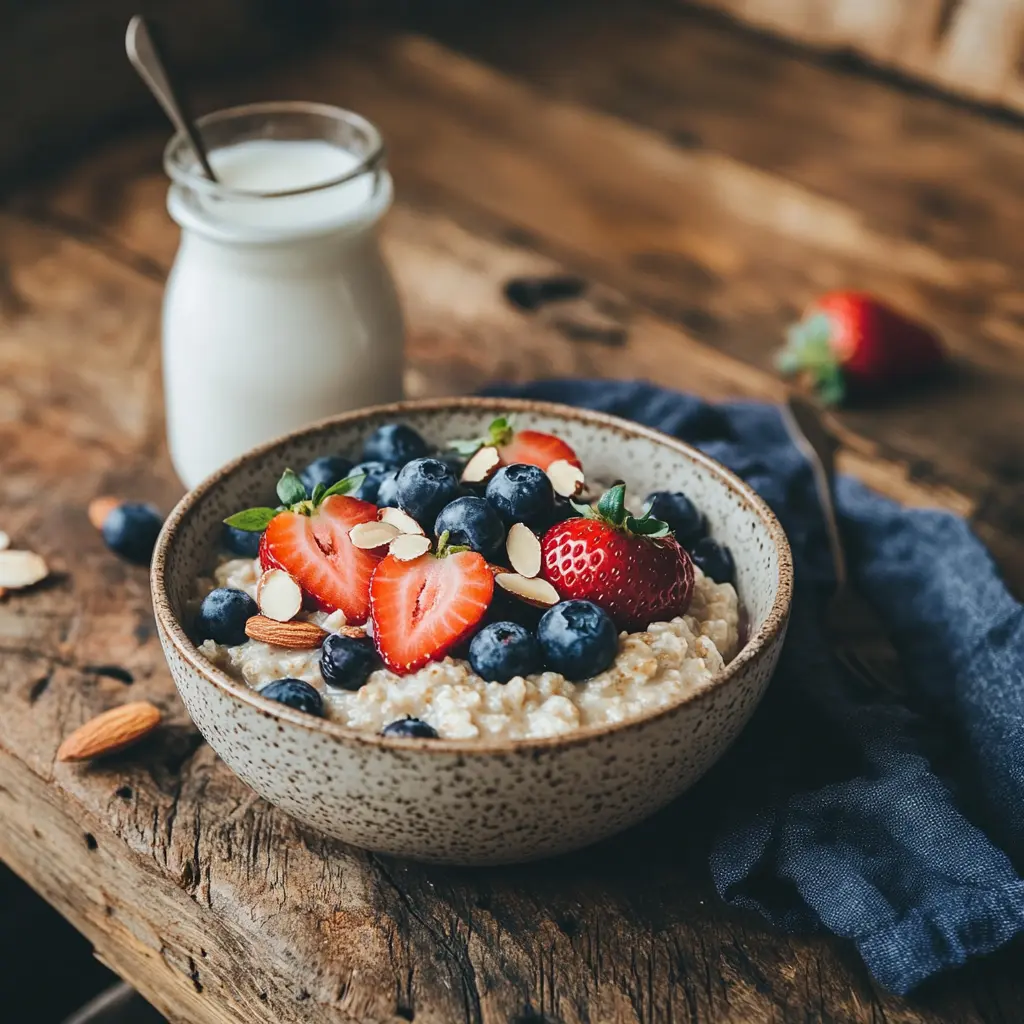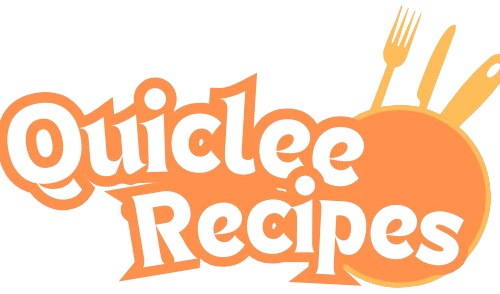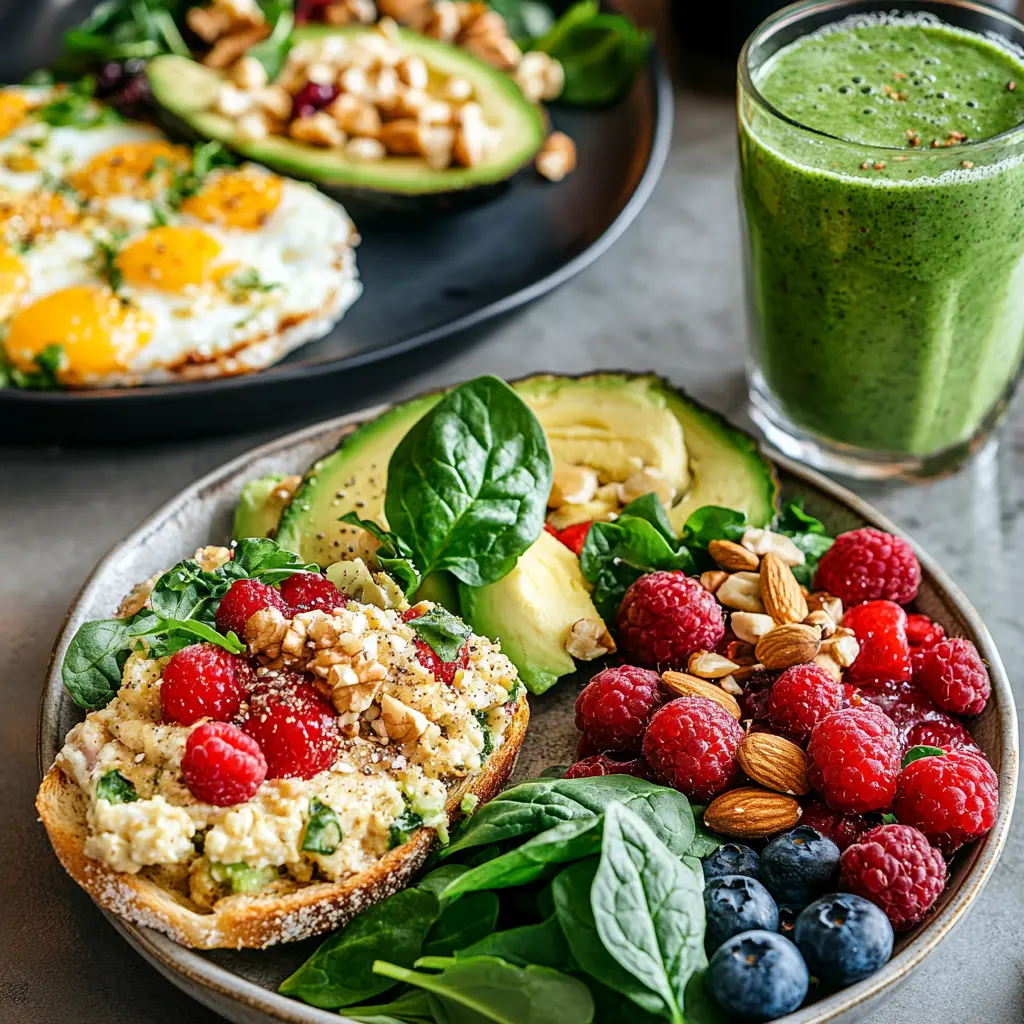Breakfast is often hailed as the most important meal of the day, and for good reason. It’s your body’s first opportunity to refuel after hours of fasting overnight, replenishing energy and nutrients essential for optimal performance. But what is the healthiest breakfast to have? Is it all about protein-packed meals, or do carbohydrates and fats deserve equal attention in crafting the perfect plate?
This article delves into the science and art of creating the healthiest breakfast. From understanding its key components to exploring customized options for specific diets and lifestyles, you’ll gain all the insights needed to design a morning meal that energizes, satisfies, and supports your long-term health goals. Let’s get started by examining why breakfast plays such a pivotal role in overall well-being.
Part 1: Introduction
Importance of Breakfast for Health
Breakfast is much more than just the meal that comes after your alarm clock rings; it sets the tone for your entire day. Eating in the morning kick-starts your metabolism, helping your body burn calories efficiently and fueling your brain for sharper focus.
Skipping breakfast can throw your body off balance, leading to sluggishness, irritability, and even long-term issues like poor blood sugar regulation. Studies from reputable sources like the Harvard T.H. Chan School of Public Health emphasize that regular breakfast eaters are less likely to suffer from obesity and heart disease compared to those who skip it.
Moreover, having breakfast improves cognitive function, which can be a game-changer, especially for kids and teens attending school or professionals navigating complex tasks. A morning meal provides the body with essential nutrients, giving you a head start on your daily vitamin and mineral needs.
Understanding a “Healthy Breakfast”
What makes breakfast healthy? It’s not just about eating something—it’s about eating right. A healthy breakfast should be balanced, containing a mix of macronutrients like proteins, carbohydrates, and fats, along with micronutrients such as vitamins and minerals.
The goal is to fuel your body without overloading it. Consuming simple carbs or sugary options might provide a quick energy spike but leaves you crashing by mid-morning. Instead, focus on options like whole grains, lean proteins, fruits, and healthy fats, which deliver sustained energy and keep you feeling full longer.
Don’t let myths like “low-calorie breakfasts are best” mislead you. Your body needs energy in the morning, and cutting corners on calories could lead to overeating later in the day.
Part 2: Key Components of What is the Healthiest Breakfast to Have
A well-rounded breakfast doesn’t happen by accident—it’s crafted with care, combining essential nutrients to fuel your body and mind. This part dives deep into the building blocks of a nutritious breakfast, emphasizing the importance of macronutrients, micronutrients, fiber, and hydration.
Essential Macronutrients: Protein, Carbs, and Fats
Macronutrients are the foundation of every healthy breakfast. They provide the energy and structural components your body needs to function. Let’s break down their roles:
Protein: The Powerhouse of Satiety
Protein isn’t just for muscle growth—it’s essential for tissue repair, immune health, and keeping you full longer. Incorporating high-protein foods into your breakfast can curb mid-morning hunger pangs and prevent overeating throughout the day.
Some excellent sources of protein include:
- Eggs: Rich in essential amino acids and versatile for any dish.
- Greek yogurt: Low in sugar but packed with creamy goodness.
- Plant-based options: Tofu, chickpeas, and nut butter are great alternatives.
Carbohydrates: The Brain’s Best Friend
Carbs often get a bad rap, but they’re the primary energy source for your brain and muscles. The key is choosing complex carbohydrates over refined ones to ensure sustained energy without sugar crashes.
Healthy carbohydrate options include:
- Whole grains: Oats, quinoa, or whole-grain bread are loaded with fiber and nutrients.
- Sweet potatoes: A naturally sweet, vitamin-packed alternative to traditional starchy carbs.
- Fruits: Berries, bananas, and apples offer quick energy and antioxidants.
Fats: The Unsung Hero
Healthy fats are vital for brain health, hormone production, and keeping you satiated. Adding fats to your breakfast stabilizes blood sugar levels and improves the absorption of fat-soluble vitamins like A, D, E, and K.
Incorporate these healthy fats into your breakfast:
- Avocado: Creamy, delicious, and nutrient-rich.
- Nuts and seeds: Almonds, chia seeds, and flaxseeds are rich in omega-3s.
- Olive oil: A drizzle over eggs or toast adds flavor and heart-healthy benefits.
Micronutrients and Fiber for a Balanced Start
Micronutrients: Small But Mighty
While macronutrients provide energy, micronutrients are the unsung heroes of health. Vitamins and minerals play a crucial role in metabolism, immune defense, and overall vitality.
Some breakfast-friendly micronutrient sources include:
- Calcium: Found in dairy, fortified plant milk, and leafy greens.
- Vitamin C: Abundant in citrus fruits, strawberries, and kiwis.
- Iron: Boost your intake with spinach, fortified cereals, and legumes.
To ensure you’re getting enough, aim for colorful meals. A breakfast plate brimming with vibrant fruits, veggies, and whole grains is likely to pack a variety of micronutrients.
Fiber: The Digestive Dynamo
Fiber is a must-have for any healthy breakfast. It keeps your digestive system on track, reduces cholesterol, and helps you stay full. Adults should aim for about 25-30 grams of fiber daily, starting with your morning meal.
Top fiber-rich foods for breakfast:
- Oats: Combine them with fruits and nuts for a fiber-packed bowl.
- Chia seeds: Add to yogurt or smoothies for an extra boost.
- Vegetables: Yes, veggies can belong at breakfast—try adding spinach or peppers to omelets.
Hydration and Morning Drinks: The Unsung Heroes
Many overlook hydration as part of a healthy breakfast, but staying hydrated is just as important as what’s on your plate. Your body loses water overnight, and starting the day with fluids helps restore balance.
Best Hydration Options
- Water: Start your day with a glass of water—it’s simple, effective, and essential.
- Herbal teas: Chamomile or mint teas are soothing and caffeine-free options.
- Green tea: Offers a gentle caffeine boost along with antioxidants.
- Smoothies: A combination of water or milk, fruits, and greens provides both hydration and nutrients.
What to Avoid
Skip sugary drinks like sodas or processed fruit juices. While they might taste good, they often contain empty calories and spike blood sugar levels, leaving you feeling drained later.
Why Balance Matters
When your breakfast incorporates all these components—proteins, carbs, fats, fiber, micronutrients, and hydration—you’re providing your body with everything it needs to perform at its best. It’s not just about ticking boxes but about enjoying food that fuels both your body and spirit.
Part 3: Top Choices for What is the Healthiest Breakfast to Have
A nutritious breakfast doesn’t have to be complicated or boring. The key lies in choosing wholesome, versatile ingredients that pack flavor, energy, and nourishment. In this section, we’ll explore some of the healthiest breakfast options, from whole grains to plant-based delights, that cater to diverse preferences and lifestyles.
Whole-Grain-Based Meals
Whole grains are nutritional powerhouses, offering complex carbohydrates, fiber, and a range of essential nutrients. Unlike refined grains, they provide sustained energy and support digestive health.

Oats: A Breakfast Staple
Oats are incredibly versatile and easy to prepare, making them a go-to choice for many. You can whip up a bowl of warm oatmeal topped with fruits, nuts, and a drizzle of honey for a comforting start to the day. Alternatively, prepare overnight oats with almond milk, chia seeds, and berries for a grab-and-go meal.
Quinoa: Not Just for Lunch
Quinoa is a complete protein and a great gluten-free alternative. Pair it with almond butter, banana slices, and a sprinkle of cinnamon for a hearty, nutrient-rich breakfast bowl.
Whole-Grain Bread or Wraps
Toast made from whole-grain bread is a quick, balanced option. Top it with avocado slices and a poached egg for a mix of healthy fats, protein, and carbs. Wraps filled with lean proteins and veggies are another excellent choice for busy mornings.
High-Protein Breakfast Choices
Protein is the star ingredient for long-lasting satiety, and incorporating it into your morning routine is easier than you think.
Egg-Based Dishes
Eggs are the ultimate breakfast protein source. Scrambled, boiled, or turned into an omelet with spinach and feta, they’re a simple way to kick-start your day. For variety, try egg muffins baked with diced veggies and cheese—perfect for meal prepping.
Yogurt Bowls
Greek yogurt is a protein-packed base for endless combinations. Add granola, chia seeds, and fresh fruit for a satisfying mix of textures and flavors. If dairy isn’t for you, opt for plant-based yogurts made from almonds or coconuts.
Nuts and Nut Butter
A handful of almonds or a dollop of peanut butter on your toast provides a dose of protein, healthy fats, and an irresistible nutty flavor. Pair them with whole fruits or whole-grain crackers for balance.
Plant-Based Breakfast Ideas
Plant-based breakfasts are both nutritious and environmentally friendly, offering plenty of variety for vegans or those looking to reduce animal products.

Avocado Toast
Avocado toast has earned its reputation as a breakfast classic. Spread mashed avocado on whole-grain bread, sprinkle it with chili flakes and lemon juice, and top with sliced tomatoes for a simple yet nutrient-rich meal.
Chia Seed Pudding
Chia seeds soaked overnight in plant-based milk create a creamy pudding packed with omega-3s, fiber, and protein. Add fresh fruits, nuts, or a drizzle of maple syrup for natural sweetness.
Smoothie Bowls
Blending frozen fruits, spinach, and a scoop of plant-based protein powder results in a thick smoothie you can eat with a spoon. Top with granola, coconut flakes, or fresh berries for an aesthetically pleasing and nourishing meal.
Fruits and Smoothies for Nutrient Density
Fruits are nature’s fast food, delivering a quick hit of vitamins, antioxidants, and natural sugars for energy.
Fresh Fruit Platters
A colorful mix of berries, kiwi, orange slices, and melon is not only visually appealing but also rich in fiber and hydration. Pair it with yogurt or a handful of nuts for added protein and fats.
Balanced Smoothies
Smoothies are ideal for busy mornings. Blend spinach, banana, frozen berries, and almond milk for a nutrient-packed drink. For added protein, toss in a scoop of protein powder or a tablespoon of peanut butter.
With these ideas in your arsenal, you’re equipped to create breakfasts that are both delicious and nutritionally complete. Whether you prefer savory dishes or sweet treats, these options ensure your mornings start on a high note. Up next, we’ll explore how to customize breakfast to fit your unique dietary needs and lifestyle.
Part 4: How to Customize What is the Healthiest Breakfast to Have for You
No two people are alike, and the same goes for their breakfast preferences. Tailoring your morning meal to match your dietary requirements, lifestyle, and time constraints can significantly improve its effectiveness and enjoyability. This section focuses on crafting breakfasts that fit specific diets and busy schedules while ensuring optimal nutrition.
Diet-Specific Breakfasts
Whether you’re following a particular diet for health reasons or personal choice, there’s always a way to create a satisfying, nutrient-rich breakfast.
Keto-Friendly Options
The ketogenic diet prioritizes low-carb and high-fat meals, making traditional breakfast fare tricky. But with a bit of creativity, it’s easy to stay on track. Try scrambled eggs cooked in olive oil with avocado slices and a side of sautéed spinach. Another option is chia seed pudding made with unsweetened almond milk, topped with crushed nuts.
Vegan Choices
For plant-based eaters, the possibilities are endless. A tofu scramble with bell peppers, onions, and turmeric offers a savory, protein-packed start to the day. Smoothies with plant-based protein powder, almond milk, and frozen fruits are perfect for a quick and refreshing breakfast.
Gluten-Free Meals
If gluten isn’t an option, consider alternatives like millet porridge, rice cakes with nut butter, or quinoa bowls topped with fresh fruit and nuts. These options ensure you don’t miss out on flavor or nutrients.
Lifestyle-Based Choices
Your daily activity level and schedule can influence what kind of breakfast works best for you.
For Active Lifestyles
If you’re an athlete or have a physically demanding routine, a calorie-dense, protein-rich breakfast is essential. Overnight oats with Greek yogurt, bananas, and a sprinkle of chia seeds provide a balanced mix of carbs and protein to fuel your workouts.
For Sedentary Lifestyles
For those with less active routines, portion control and lower-calorie options are key. A small bowl of oatmeal with berries or a hard-boiled egg with whole-grain toast can keep energy levels steady without overloading on calories.
Tips for Making Breakfast Quick and Easy
Mornings can be chaotic, but that doesn’t mean breakfast has to suffer. Prepare meals in advance by making overnight oats, egg muffins, or chia seed pudding. Keep grab-and-go options like protein bars or fruit handy for busy days. Finally, investing in tools like blenders and meal prep containers can streamline your routine.
With these customizations, breakfast becomes an adaptable, enjoyable part of your day that works with your unique needs and goals.
FAQs:
What is the best breakfast for weight loss?
The best breakfast for weight loss is one that is high in protein and fiber while being low in refined carbs and added sugars. For example, scrambled eggs with spinach and whole-grain toast or a bowl of Greek yogurt topped with berries and chia seeds provides a satisfying meal that keeps you full longer. Incorporating foods with a low glycemic index, like oats or quinoa, can also help regulate blood sugar and reduce cravings later in the day.
Can I skip breakfast and still be healthy?
Yes, it’s possible to maintain good health even if you skip breakfast, especially if you follow an intermittent fasting schedule. However, skipping breakfast may not suit everyone. For individuals who experience low energy or difficulty concentrating in the morning, eating breakfast can provide the necessary fuel to perform at their best. If you skip breakfast, ensure that your subsequent meals are nutrient-dense to meet your daily dietary needs.
Is it better to eat a big or small breakfast?
The size of your breakfast depends on your personal preferences, daily schedule, and energy demands. Some people thrive on a large breakfast packed with a mix of proteins, carbs, and fats, while others prefer a lighter option. Studies suggest that a balanced, substantial breakfast can help with weight management and improve energy levels throughout the day. However, consistency and overall calorie intake matter more than meal size.
What are good protein-rich breakfast ideas?
There are many delicious protein-rich breakfasts to try:
- An omelet loaded with veggies and a side of whole-grain toast.
- Greek yogurt parfait with granola, nuts, and fresh fruit.
- Tofu scramble with spinach and mushrooms.
- Smoothies made with almond milk, a scoop of protein powder, and peanut butter.
These options ensure you start your day with sustained energy and satisfaction.
How can I make my breakfast more balanced?
To make your breakfast more balanced, aim for a mix of macronutrients:
- Protein: Eggs, yogurt, tofu, or nuts.
- Carbohydrates: Whole grains like oats, quinoa, or whole-grain bread.
- Fats: Avocado, olive oil, or seeds.
Add fruits or vegetables for extra fiber, vitamins, and minerals. This balance ensures your breakfast is nutrient-dense and keeps you energized.
Which foods should be avoided at breakfast?
It’s best to steer clear of highly processed or sugary foods for breakfast, such as pastries, sugary cereals, and breakfast bars with high-fructose corn syrup. These options may cause a quick energy spike followed by a crash. Instead, choose whole, minimally processed ingredients to start your day on the right note.
Conclusion
A healthy breakfast is more than just a morning ritual—it’s the foundation for your daily well-being. By incorporating proteins, whole grains, healthy fats, and a variety of fruits and vegetables, you can create a balanced meal that fuels your body and keeps you satisfied.
Remember, customization is key. Whether you’re following a specific diet, have a demanding lifestyle, or prefer quick and easy options, there’s a nutritious breakfast waiting to fit your needs. Make breakfast a priority, and you’ll likely notice improved energy, focus, and overall health throughout the day.

